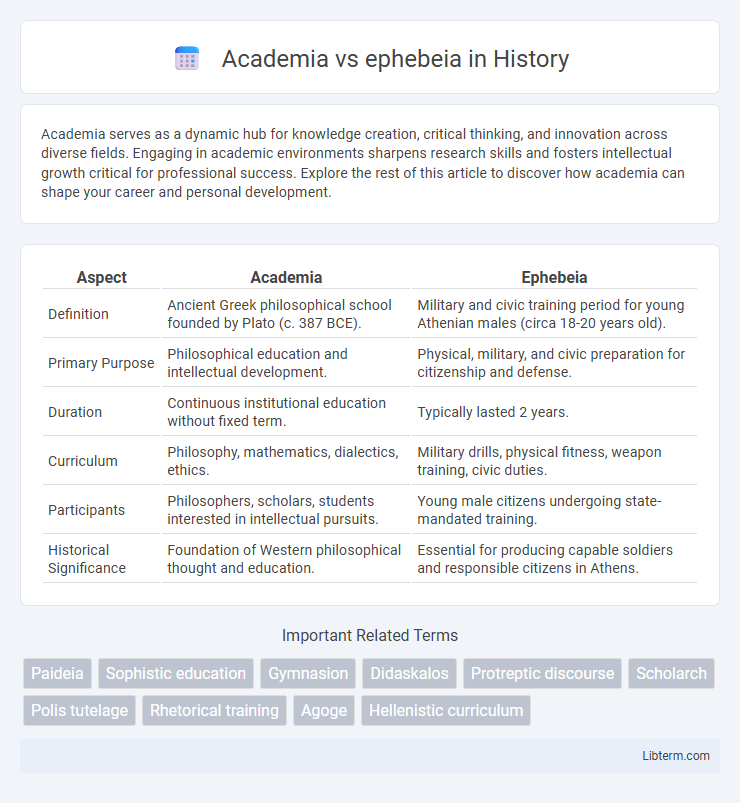Academia serves as a dynamic hub for knowledge creation, critical thinking, and innovation across diverse fields. Engaging in academic environments sharpens research skills and fosters intellectual growth critical for professional success. Explore the rest of this article to discover how academia can shape your career and personal development.
Table of Comparison
| Aspect | Academia | Ephebeia |
|---|---|---|
| Definition | Ancient Greek philosophical school founded by Plato (c. 387 BCE). | Military and civic training period for young Athenian males (circa 18-20 years old). |
| Primary Purpose | Philosophical education and intellectual development. | Physical, military, and civic preparation for citizenship and defense. |
| Duration | Continuous institutional education without fixed term. | Typically lasted 2 years. |
| Curriculum | Philosophy, mathematics, dialectics, ethics. | Military drills, physical fitness, weapon training, civic duties. |
| Participants | Philosophers, scholars, students interested in intellectual pursuits. | Young male citizens undergoing state-mandated training. |
| Historical Significance | Foundation of Western philosophical thought and education. | Essential for producing capable soldiers and responsible citizens in Athens. |
Introduction: Defining Academia and Ephebeia
Academia refers to the global community of scholars, researchers, and educational institutions dedicated to knowledge creation and dissemination across diverse disciplines. Ephebeia, rooted in ancient Greek tradition, denotes the stage of youthful training and civic education preparing adolescents for adult citizenship and military service. Understanding these concepts highlights the contrast between structured intellectual pursuits in Academia and the formative, societal role of Ephebeia in classical education systems.
Historical Origins of Academia
The historical origins of Academia trace back to Plato's establishment of the Academy in Athens around 387 BCE, which became the cornerstone of Western philosophical and scientific thought. This institution emphasized rigorous dialectical methods and aimed to cultivate intellectual virtues among its members, distinctly setting it apart from the contemporaneous ephebeia system. Unlike ephebeia, which functioned primarily as a military and civic training program for Athenian youth aged 18 to 20, the Academy focused on lifelong philosophical inquiry and education.
The Emergence of the Ephebeia System
The emergence of the Ephebeia system in ancient Greece marked a significant evolution in youth education and civic training, distinct from the more philosophically oriented Academia established by Plato. This system focused on preparing young men, known as ephebes, through rigorous military training, physical conditioning, and civic responsibilities to ensure their readiness as active citizens and defenders of the polis. The structured curriculum of Ephebeia reflected the societal emphasis on discipline and practical skills, contrasting with the intellectual and ethical inquiries that dominated academic institutions like the Academy.
Educational Philosophies: Contrasts and Similarities
Academia emphasizes formalized education rooted in critical reasoning, theoretical knowledge, and systematic inquiry, reflecting a tradition shaped by Plato's Academy. Ephebeia, in contrast, centers on practical training, civic responsibility, and physical discipline, rooted in ancient Greek youth programs fostering societal integration and moral development. Both philosophies share a commitment to cultivating virtue and intellect, yet diverge in prioritizing abstract thought versus experiential learning within educational frameworks.
Curriculum and Pedagogy: Academia vs Ephebeia
The curriculum at Academia emphasized a broad education in philosophy, mathematics, and rhetoric, fostering critical thinking and dialectical skills through formal lectures and dialogues. Ephebeia, however, focused on practical military training, civic responsibility, and physical development, using hands-on instruction and mentorship to prepare young men for active roles in the polis. Pedagogically, Academia relied on Socratic questioning and theoretical exploration, while Ephebeia employed experiential learning and discipline to instill virtues and skills.
Social and Civic Roles in Ancient Greece
The Academia, a renowned philosophical institution founded by Plato, emphasized education in ethics, politics, and philosophy, shaping elite citizens' intellectual and civic virtues. Ephebeia referred to the structured military and civic training of young Athenian males, preparing them for full participation in democratic governance and defense. Together, these systems cultivated a balance of intellectual development and practical experience essential for active social and civic engagement in Ancient Greek society.
Admission and Membership Criteria
Admission to the Academia required rigorous philosophical training, demonstrated intellectual aptitude, and often an endorsement from existing members, emphasizing scholarly merit and commitment to Platonic teachings. Membership in the Ephebeia centered on age-specific eligibility, typically young males undergoing military and civic training, with criteria focused on physical readiness and social status within the polis. While Academia prioritized lifelong philosophical engagement, Ephebeia membership was a transitional phase marked by specific civic duties and societal integration.
Lasting Influence on Modern Education
Academia, rooted in Plato's Academy, established a foundational model for structured, systematic learning emphasizing critical thinking and dialectic methods, deeply influencing contemporary higher education institutions worldwide. Ephebeia, the ancient Greek practice of rigorous physical and military training for youth, contributed to modern educational frameworks by promoting holistic development, integrating physical education and civic responsibility into curricula. Together, these paradigms underscore the enduring legacy of combining intellectual rigor and character formation, shaping the comprehensive educational philosophies prevalent in modern schooling systems.
Notable Figures and Alumni
The Academy, founded by Plato around 387 BCE, boasts notable figures like Aristotle who studied and taught there, significantly influencing Western philosophy and science. Conversely, Ephebeia, an ancient Greek military training institution, produced prominent statesmen and warriors such as Alcibiades, highlighting its role in shaping leadership and civic responsibility in Athens. Both institutions contributed uniquely to classical education and societal development, with alumni whose legacies impacted philosophy, politics, and military strategy.
Conclusion: Legacy and Relevance Today
The legacy of Academia, founded by Plato, endures as a cornerstone of Western philosophical and educational traditions, emphasizing rigorous inquiry and the pursuit of knowledge. Ephebeia, the ancient Greek rite of passage, remains relevant in contemporary studies of citizenship, social integration, and youth development, highlighting the cultural importance of education in shaping responsible individuals. Together, they underscore the enduring significance of structured learning and moral formation in both historical and modern contexts.
Academia Infographic

 libterm.com
libterm.com